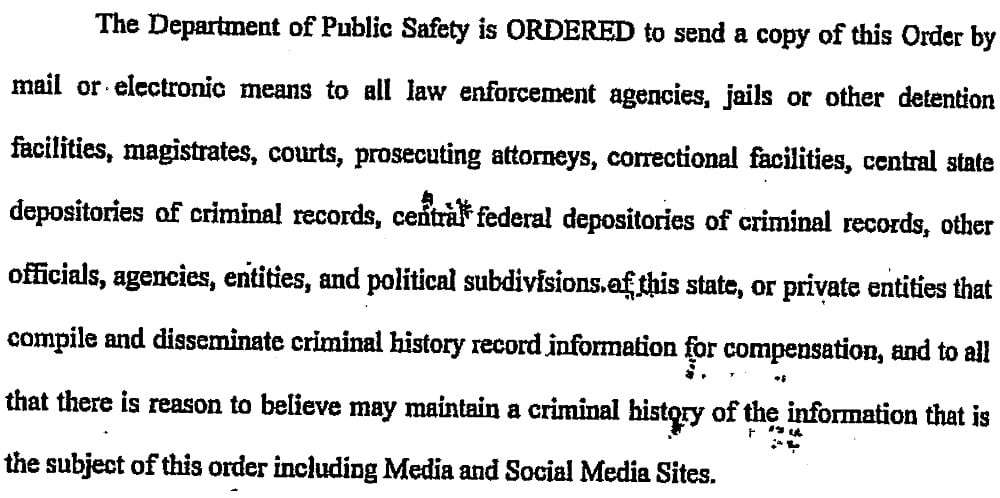The Volokh Conspiracy
Mostly law professors | Sometimes contrarian | Often libertarian | Always independent
Mum's the word: Secret proceeding about secret order to keep secret a police abuse guilty plea

(iStock)
According to a 2013 Houston Chronicle article, Derek Collier Thorworth was indicted for "hitting a handcuffed prisoner … in the back of a patrol car"; Thorworth was a Harris County, Tex., deputy constable at the time. In February 2016, according to Houston Channel 2, Thorworth pleaded guilty:
The incident happened in [victim Ferry Rounds'] North Harris County driveway in August 2012 after the now-32-year-old failed to pull over initially for a traffic stop involving expired registration. Former deputy constable Derek Collier Thorworth, a supervisor, was called to the scene and audio from dash cam video reveals he punched a handcuffed Rounds when Rounds wouldn't give his name. Rounds said another deputy constable already had possession of his driver's license.
"I'm observing the law and observing my right to remain silent and here comes this supervisor," Rounds said. "The higher ranked of all the officers out there doing physical harm to me."
Then, this May, Thorworth demanded that Channel 2 take down its story about the guilty plea and asked Google to de-index that story, which would have vanished the article from Google searches; here is his explanation for the request:
I have a court order of Non Disclosure issued from a Harris County District Court, Court 182…. I currently still hold a Texas Peace Officers License and this information severely hinders my credibility.
Texas law has a procedure by which someone can plead guilty, get probation and then, if he successfully completes probation, get a "nondisclosure order" that orders government agencies not to disclose information about his criminal record; the law also covers some commercial criminal history databases (though I think it's constitutionally suspect as to them).
But Thorworth used that procedure to get a court order, issued by 182nd District Court Judge Jeannine Barr, that seemed to cover "Media and Social Media Sites," as well as government sites and record database sites. Thorworth's position was thus apparently that the TV station was legally obligated to take down the story about his guilty plea. (Thorworth deliberately didn't attach the order to his Google request, because he didn't want the order to be publicized; it took me more than three months to track it down.)
Tthe order is a bit opaque, because it's written in an indirect style; it says that, "The Court finds that Petitioner is entitled to Non-Disclosure of the following information," and then orders the Department of Public Safety to send a copy of the order to various government officials, as well as to "private entities that compile and disseminate criminal history record information for compensation, and to all that there is reason to believe may maintain a criminal history of the information that is the subject of this order including Media and Social Media Sites."

That sounds like it was intended to order "Media … Sites," such as Channel 2, to stop disclosing the information about Thorworth's criminal record; that was certainly Thorworth's view.
To its credit, Channel 2 engaged a lawyer (Thomas J. Forestier of Winstead PC) to challenge this in court, (1) on First Amendment grounds, (2) on Due Process Clause grounds, and (3) on statutory grounds. Its arguments strike me as quite correct: Ordering a newspaper to take down the story would violate the First Amendment, even if the conviction had been expunged as a first offense (see, e.g., Martin v. Hearst Corp.), and here there wasn't even an expungement. The newspaper in any event couldn't be bound to an order that was entered with no opportunity for it to be heard. And the nondisclosure order statute doesn't purport to bind the media, and doesn't authorize courts to bind the media.
Last month, the court deleted the phrase "including Media and Social Media Sites" and expressly stated that the order "does not apply to news media and shall in no way affect the publication or republication by the media of news reports, articles, or broadcasts." Channel 2 also never took down the story, whether because it got a stay of the order or was willing to risk violating it; Google likewise never de-indexed it. Still, fighting the order likely cost Channel 2 tens of thousands of dollars in legal fees.
But what especially troubles me (besides the unconstitutionality of the order) is that the entire fight, as best I can tell, took place in secret. The original records of the conviction are of course not available to the public, because of the nondisclosure order. But the documents related to Channel 2's challenge to the conviction appear to be unavailable as well.
They are not on the Harris County Clerk of Court's otherwise quite thorough and useful public records site. When I called the clerk's office and tried to find out whether I could order the documents, the person I talked to couldn't find the case. Even the case number had disappeared from the system. An experienced Houston reporter with whom I talked about this likewise couldn't get anything. I tracked down the documents by finding someone who was allowed to give them to me; but that was just because I knew where to look (and was willing to be a pest).
This is not the way that proceedings in our country's courts are supposed to work. True, there is some secrecy in some areas (such as national security or juvenile justice). But even when national security is at stake, newspapers are almost never ordered to take down material (see the Pentagon Papers case), and any litigation about the subject - especially litigation that considers whether any such orders violate the First Amendment - proceeds as publicly as possible.
Perhaps there might be some redactions. Perhaps there might be some sealed documents. But entire case files, including secrecy orders, themselves being secret - that is very far from the norm, especially when the only thing at stake is a former law enforcement officer's continued employability. (And, yes, I did check, and Thorworth does still have his Peace Officer License.)
Thanks to the Lumen Database for shedding the first rays of light on this.


Show Comments (0)